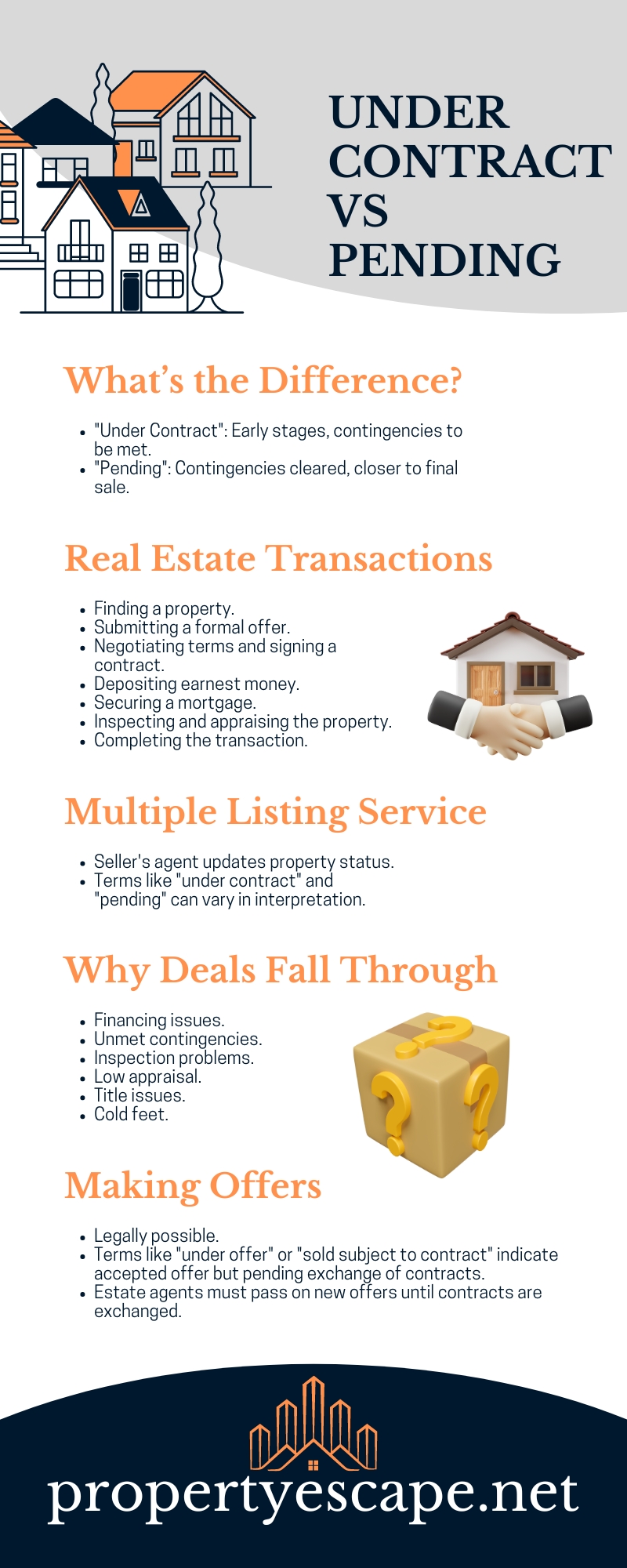Real estate jargon can be a headache. Buyers and sellers face a mountain of terms. It’s tough to get the hang of it, especially when you’re in a rush to sell your home. It’s time to clear up a couple of these terms.
Buyers often ask us about “under contract” and “pending.” These words pop up a lot when homes are for sale. They can be confusing. Different websites, states, and markets use them in their own ways.
We aim to clarify the confusion. “Under contract” and “pending” both indicate a home is in the process of being sold, yet they are not identical. Each term represents a different stage in the sale process.

How do Real Estate Transactions Work?

Buying a home involves several steps. Here they are, simply put:
- A potential buyer finds a property.
- They submit a formal offer.
- The buyer and seller negotiate the price and closing timeline.
- The seller agrees to the terms.
- Both parties sign a contract, usually with conditions like financing approval and property evaluation.
- The buyer deposits earnest money into an escrow account.
- The buyer works on securing a mortgage.
- The property is inspected and appraised.
- The transaction is completed.
What About Multiple Listing Service?

As a property sale progresses, the seller’s real estate agent updates its status in the MLS. These updates are then shared with other real estate websites.
Different platforms may interpret terms like ‘under contract’ and ‘pending’ in various ways.
Typically, ‘under contract’ indicates an offer has been accepted with conditions yet to be fulfilled.
‘Pending’ usually means all conditions have been met and the sale is nearing completion.
Sale Pending vs. Under Contract
The article by Michael Yessis on Clever Real Estate’s blog provides a detailed explanation of the distinctions between properties that are “pending” and those that are “under contract” in the real estate market.
Both “pending” and “under contract” indicate that a seller has accepted a buyer’s offer on a house or property. The key difference lies in the stage of the home-purchase process they represent:
These contingencies are conditions that must be met for the contract to become legally binding. The “under contract” phase is characterized by its potential for deals to fall apart, especially if contingencies are not met.
Michael further explains that while it’s often possible to make an offer on a house that is either pending or under contract, the chances of successfully purchasing a home in these statuses vary. Properties under contract may still accept other offers, especially if the initial deal faces obstacles. On the other hand, making an offer on a pending property is more challenging due to the advanced stage of the sale process, though not impossible.
Why do Sales Pending or Under Contract Fall Through?

In our further research, we found that there are many reasons why this is happening.
Mia Taylor, a well-known journalist in the field of real estate, provides an insightful look into why deals that are pending or under contract might not reach closing in her article on Bankrate.
- Financing Not Approved: Even with a mortgage preapproval, changes in the buyer’s financial situation, such as a new debt or a drop in credit score, can lead to the mortgage not being finalized.
- Contingencies Not Met: Home purchase agreements often include contingencies, like the need for the buyer to sell their current home or secure a mortgage. If these conditions aren’t met, the deal can fall apart.
- Inspection Problems: Significant issues discovered during the home inspection can lead to the deal’s termination if the buyer and seller can’t agree on how to address them.
- Low Appraisal: If the home appraises for less than the purchase price, and the buyer cannot cover the difference, the deal may not proceed unless renegotiated.
- Title Issues: Liens or other legal claims against the property revealed during a title search can prevent the sale.
- Cold Feet: Either party may simply change their mind about going through with the sale, which can lead to the deal falling apart, subject to any legal or financial consequences outlined in the sale agreement.
Can I Make a Formal Offer on a Sale Pending or Under Contract?

You can still legally make an offer on the property if you wish because homes that are pending or under contract haven’t technically been sold yet.
As experts from OnTheMarket explain, when a property is described as “under offer” or “sold subject to contract” (SSTC), it generally means the seller has accepted an offer, but the contracts have not yet been exchanged.
This period can last several months due to necessary surveys, mortgage approvals, and other pre-sale processes. During this time, the sale can still fall through for various reasons, such as issues uncovered by a survey.
You can indeed make an offer on a house that is “under offer” or “sold subject to contract.” Many buyers and estate agents might prefer to use these terms to discourage further offers, aiming to proceed smoothly to the exchange of contracts. However, the practice of gazumping, where a new offer is accepted over an existing one, still occurs.
Legally, estate agents are required to pass any new offers to the seller until contracts are exchanged. Therefore, if you’re interested in a property that’s under offer or SSTC, you should not automatically assume it’s off the market. The final decision rests with the seller, who may consider new offers, especially if they are higher than the original
FAQ
I’m Tanner Murphy, a retired real estate agent from California, now writing for propertyescape.net. I simplify California’s complex real estate laws for readers, making it easier to understand and navigate the market.







